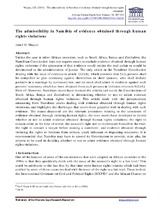| dc.contributor.author | Mujuzi, Jamil Ddamulira | |
| dc.date.accessioned | 2018-05-29T11:37:19Z | |
| dc.date.available | 2018-05-29T11:37:19Z | |
| dc.date.issued | 2016 | |
| dc.identifier.citation | Mujuzi, J.D. (2016). ‘The admissibility in Namibia of evidence obtained through human rights violations’ African Human Rights Law Journal, 16: 407-434. | en_US |
| dc.identifier.issn | 1609-073X | |
| dc.identifier.uri | http://dx.doi.org/10.17159/1996-2096/2016/v16n2a5 | |
| dc.identifier.uri | http://hdl.handle.net/10566/3744 | |
| dc.description.abstract | Unlike the case in other African countries, such as South Africa, Kenya and Zimbabwe, the Namibian Constitution does not require courts to exclude evidence obtained through human rights violations if the admission of that evidence would render the trial unfair or would be detrimental to the administration of justice. The only article in the Namibian Constitution dealing with the issue of evidence is article 12(1)(b), which provides that ‘[n]o persons shall be compelled to give testimony against themselves or their spouses, who shall include partners in a marriage by customary law, and no court shall admit in evidence against such persons’ testimony which has been obtained from such persons in violation of article 8(2)(b)
Here of’. However, Namibian courts have invoked the criteria (set out in the Constitutions of South Africa, Kenya and Zimbabwe) in determining whether or not to admit evidence obtained through human rights violations. This article deals with the jurisprudence emanating from Namibian courts dealing with evidence obtained through human rights violations, and highlights the challenges that courts have grappled with in dealing with such evidence. The issues discussed are the relevant provisions relating to the admission of evidence obtained through violating human rights; the tests courts have developed to decide whether or not to admit evidence obtained through human rights violations; the right to remain silent at the time of arrest; the accused’s right not to incriminate himself at the trial; the right to consult a lawyer before making a statement; and evidence obtained through violating the rights to freedom from torture, cruel, inhuman or degrading treatment. It is recommended that Namibia may have to amend its Constitution to provide, inter alia, for criteria to be used in deciding whether or not to admit evidence obtained through human rights violations. | en_US |
| dc.language.iso | en | en_US |
| dc.publisher | Pretoria University Law Press | en_US |
| dc.rights | This is the author version of the article published online at: http://dx.doi.org/10.17159/1996-2096/2016/v16n2a5 | |
| dc.subject | Evidence | en_US |
| dc.subject | Admissibility | en_US |
| dc.subject | Namibia | en_US |
| dc.subject | Human Rights Violations | en_US |
| dc.subject | Fair Trial | en_US |
| dc.subject | Obtained | en_US |
| dc.title | The admissibility in Namibia of evidence obtained through human rights violations | en_US |
| dc.type | Article | en_US |
| dc.privacy.showsubmitter | FALSE | |
| dc.status.ispeerreviewed | TRUE | |
| dc.description.accreditation | DHET | |

